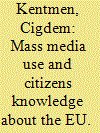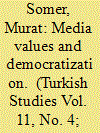|
|
|
Sort Order |
|
|
|
Items / Page
|
|
|
|
|
|
|
| Srl | Item |
| 1 |
ID:
102360


|
|
|
|
|
| Publication |
2010.
|
| Summary/Abstract |
The impact of the mass media on individuals' political behavior has received a lot of scholarly attention. However, there has been little research done to determine whether and to what degree the media affects citizens' knowledge about the EU. This paper examines whether Turkish citizens' level of knowledge about the EU varies with exposure to television, radio and newspapers using empirical evidence from the 2006 Eurobarometer survey data.
|
|
|
|
|
|
|
|
|
|
|
|
|
|
|
|
| 2 |
ID:
102357


|
|
|
|
|
| Publication |
2010.
|
| Summary/Abstract |
This article presents a systematic content analysis of three religious-conservative and two pro-secular newspapers in 1996-2004 in Turkey, and discusses some findings and their implications regarding elite values and democratization: considerable internal pluralism within both religious-conservative and pro-secular elites; general consensus on democracy but not on democratic norms' application to specific issues and groups other than one's own; a division of values on religion, secularism, and social pluralism; political value change in favor of liberal democracy but social conservatism among religious-conservative elites; fragmentation and relative cynicism, but not necessarily authoritarianism, among pro-secular elites; weak ideational change on the Kurdish issue. The article argues that the press plays a significant political role as a site where elite values change or are reproduced through discussion, deliberation, or silence. Values affect and are affected by political developments.
|
|
|
|
|
|
|
|
|
|
|
|
|
|
|
|
| 3 |
ID:
102361


|
|
|
| 4 |
ID:
102358


|
|
|
|
|
| Publication |
2010.
|
| Summary/Abstract |
This article reviews political parallelism in the Turkish press from a historical and comparative perspective, covering the period from the 1830s to the 2002 elections. Overall, political parallelism in the Turkish press is at moderate to high levels, placing it together with Mediterranean countries, and there is no single discernible trend from higher to lower parallelism. The modernization explanation positing less parallelism with modernization fails to capture the situation in the Turkish press. There is more parallelism when ideological polarization in the party system is high, when coalition governments rule the country instead of single party governments, and when cleavage voting is strong. Number of parties in the system does not seem to have the hypothesized relationship with parallelism.
|
|
|
|
|
|
|
|
|
|
|
|
|
|
|
|
| 5 |
ID:
102355


|
|
|
|
|
| Publication |
2010.
|
| Summary/Abstract |
This article sets out to examine the linkages between the media and politics in Turkey. It argues that, rooted in the world of politics from the outset, Turkish media has always been marked by a high degree of political parallelism. As regulator and funder, the state, making up the political majority, exerted strong control over the media. In the 1990s, the shift to a globalized market and the explosive growth of private broadcasting did not decrease the high degree of political parallelism. Instead, it enabled media owners to use their media properties to intervene in political decisions that have a central role in capital accumulation. Today, deeply divided into two camps, media is the principal locus of bitter political strife.
|
|
|
|
|
|
|
|
|
|
|
|
|
|
|
|
| 6 |
ID:
102359


|
|
|
|
|
| Publication |
2010.
|
| Summary/Abstract |
This article aims to measure the level of partisanship for readers of major newspapers in Turkey. In so doing partisan alignments of those newspapers as reflected in the party preferences of their readers are diagnosed. Alternatively, different levels of pluralism as reflective of newspaper outlets within different party supporters are also depicted. Using micro-individual level survey data it is shown that while internal pluralism within newspaper readership communities is declining, the external pluralism is on the rise. Decreasing internal pluralism indicates increasing bias in individual media outlets towards particular political parties.
|
|
|
|
|
|
|
|
|
|
|
|
|
|
|
|
| 7 |
ID:
102356


|
|
|
|
|
| Publication |
2010.
|
| Summary/Abstract |
Turkey has been undergoing a radical transformation process. Not only has the internal space of Turkish modernity become enlarged through the emergence and widening of identity-based conflicts and demands for recognition, Turkish politics, economy, and culture have also become exposed to the challenges of globalization and Europeanization. The impact of this transformation has been felt in every sphere of societal relations, and media in general. The social democratic/left media, in particular, has been impacted the most. This study focuses on two significant newspapers of the social democratic/left media, Cumhuriyet and Milliyet, and argues that the serious problems that these newspapers face today have to do with their inability to respond effectively to Turkey's transformation. In doing so, a brief analysis of the transformation process is presented. Finally, by situating these newspapers in this process, their drift away from their social democratic discourse on the way to becoming more reactionary and nationalist is demonstrated.
|
|
|
|
|
|
|
|
|
|
|
|
|
|
|
|
|
|
|
|
|